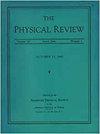Enhanced chiral edge currents and orbital magnetic moment in chiral d -wave superconductors from mesoscopic finite-size effects
引用次数: 0
Abstract
Chiral superconductors spontaneously break time-reversal symmetry and host topologically protected edge modes, supposedly generating chiral edge currents which are typically taken as a characteristic fingerprint of chiral superconductivity. However, recent studies have shown that the total edge current in two dimensions (2D) often vanishes for all chiral superconductors except for chiral $p$-wave, especially at low temperatures, thus severely impeding potential experimental verification and characterization of these superconductors. In this work, we use the quasiclassical theory of superconductivity to study mesoscopic disk-schaped chiral $d$-wave superconductors. We find that mesoscopic finite-size effects cause a dramatic enhancement of the total charge current and orbital magnetic moment (OMM), even at low temperatures. We study how these quantities scale with temperature, spontaneous Meissner screening, and system radius $\mathcal{R}\ensuremath{\in}[5,200]{\ensuremath{\xi}}_{0}$ with superconducting coherence length ${\ensuremath{\xi}}_{0}$. We find a general $1/\mathcal{R}$ scaling in the total charge current and OMM for sufficiently large systems, but this breaks down in small systems, instead producing a local maximum at $\mathcal{R}\ensuremath{\approx}10--20{\ensuremath{\xi}}_{0}$ due to mesoscopic finite-size effects. These effects also cause a spontaneous charge-current reversal opposite to the chirality below $\mathcal{R}<10{\ensuremath{\xi}}_{0}$. Our work highlights mesoscopic systems as a route to experimentally verify chiral $d$-wave superconductivity, measurable with magnetometry.介观有限尺寸效应下手性d波超导体中增强的手性边缘电流和轨道磁矩
手性超导体自发地打破时间反转对称性,并拥有拓扑保护的边缘模式,产生手性边缘电流,这通常被视为手性超导的特征指纹。然而,最近的研究表明,除了手性$p$ -波之外,所有的手性超导体在二维(2D)中的总边缘电流经常消失,特别是在低温下,从而严重阻碍了这些超导体的潜在实验验证和表征。在这项工作中,我们使用超导的准经典理论来研究介观盘形手性$d$波超导体。我们发现,即使在低温下,介观有限尺寸效应也会导致总电荷电流和轨道磁矩(OMM)的显著增强。我们研究了这些量如何随温度、自发迈斯纳筛选和系统半径$\mathcal{R}\ensuremath{\in}[5,200]{\ensuremath{\xi}}_{0}$与超导相干长度${\ensuremath{\xi}}_{0}$的比例。我们发现在足够大的系统中,总电荷电流和OMM普遍$1/\mathcal{R}$缩放,但在小系统中,由于介观有限尺寸效应,这种情况会打破,而是在$\mathcal{R}\ensuremath{\approx}10--20{\ensuremath{\xi}}_{0}$处产生局部最大值。这些效应也会引起自发的电荷-电流反转,与$\mathcal{R}<10{\ensuremath{\xi}}_{0}$下面的手性相反。我们的工作强调介观系统作为实验验证手性$d$ -波超导性的途径,可通过磁强计测量。
本文章由计算机程序翻译,如有差异,请以英文原文为准。
求助全文
约1分钟内获得全文
求助全文

 求助内容:
求助内容: 应助结果提醒方式:
应助结果提醒方式:


